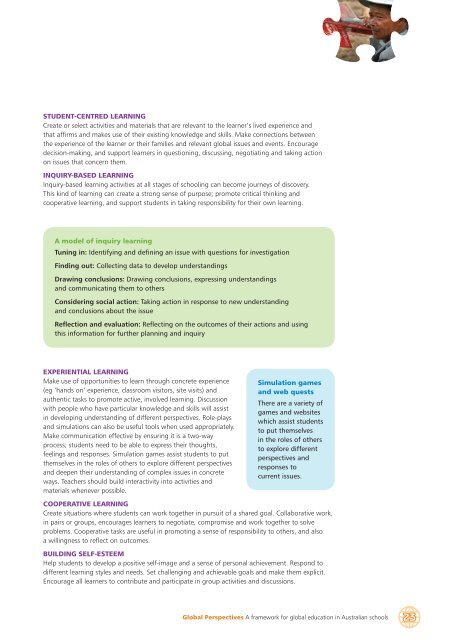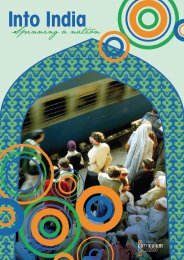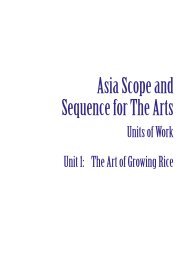A framework for global education in Australian schools
A framework for global education in Australian schools
A framework for global education in Australian schools
You also want an ePaper? Increase the reach of your titles
YUMPU automatically turns print PDFs into web optimized ePapers that Google loves.
stuDent-CentreD leArnInG<br />
Create or select activities and materials that are relevant to the learner’s lived experience and<br />
that affirms and makes use of their exist<strong>in</strong>g knowledge and skills. Make connections between<br />
the experience of the learner or their families and relevant <strong>global</strong> issues and events. Encourage<br />
decision-mak<strong>in</strong>g, and support learners <strong>in</strong> question<strong>in</strong>g, discuss<strong>in</strong>g, negotiat<strong>in</strong>g and tak<strong>in</strong>g action<br />
on issues that concern them.<br />
InquIrY-BAseD leArnInG<br />
Inquiry-based learn<strong>in</strong>g activities at all stages of school<strong>in</strong>g can become journeys of discovery.<br />
This k<strong>in</strong>d of learn<strong>in</strong>g can create a strong sense of purpose; promote critical th<strong>in</strong>k<strong>in</strong>g and<br />
cooperative learn<strong>in</strong>g, and support students <strong>in</strong> tak<strong>in</strong>g responsibility <strong>for</strong> their own learn<strong>in</strong>g.<br />
A model of <strong>in</strong>quiry learn<strong>in</strong>g<br />
Tun<strong>in</strong>g <strong>in</strong>: Identify<strong>in</strong>g and def<strong>in</strong><strong>in</strong>g an issue with questions <strong>for</strong> <strong>in</strong>vestigation<br />
f<strong>in</strong>d<strong>in</strong>g out: Collect<strong>in</strong>g data to develop understand<strong>in</strong>gs<br />
draw<strong>in</strong>g conclusions: Draw<strong>in</strong>g conclusions, express<strong>in</strong>g understand<strong>in</strong>gs<br />
and communicat<strong>in</strong>g them to others<br />
Consider<strong>in</strong>g social action: Tak<strong>in</strong>g action <strong>in</strong> response to new understand<strong>in</strong>g<br />
and conclusions about the issue<br />
reflection and evaluation: Reflect<strong>in</strong>g on the outcomes of their actions and us<strong>in</strong>g<br />
this <strong>in</strong><strong>for</strong>mation <strong>for</strong> further plann<strong>in</strong>g and <strong>in</strong>quiry<br />
exPerIentIAl leArnInG<br />
Make use of opportunities to learn through concrete experience<br />
(eg ‘hands on’ experience, classroom visitors, site visits) and<br />
authentic tasks to promote active, <strong>in</strong>volved learn<strong>in</strong>g. Discussion<br />
with people who have particular knowledge and skills will assist<br />
<strong>in</strong> develop<strong>in</strong>g understand<strong>in</strong>g of different perspectives. Role-plays<br />
and simulations can also be useful tools when used appropriately.<br />
Make communication effective by ensur<strong>in</strong>g it is a two-way<br />
process; students need to be able to express their thoughts,<br />
feel<strong>in</strong>gs and responses. Simulation games assist students to put<br />
themselves <strong>in</strong> the roles of others to explore different perspectives<br />
and deepen their understand<strong>in</strong>g of complex issues <strong>in</strong> concrete<br />
ways. Teachers should build <strong>in</strong>teractivity <strong>in</strong>to activities and<br />
materials whenever possible.<br />
simulation games<br />
and web quests<br />
There are a variety of<br />
games and websites<br />
which assist students<br />
to put themselves<br />
<strong>in</strong> the roles of others<br />
to explore different<br />
perspectives and<br />
responses to<br />
current issues.<br />
CooPerAtIve leArnInG<br />
Create situations where students can work together <strong>in</strong> pursuit of a shared goal. Collaborative work,<br />
<strong>in</strong> pairs or groups, encourages learners to negotiate, compromise and work together to solve<br />
problems. Cooperative tasks are useful <strong>in</strong> promot<strong>in</strong>g a sense of responsibility to others, and also<br />
a will<strong>in</strong>gness to reflect on outcomes.<br />
BuIlDInG self-esteem<br />
Help students to develop a positive self-image and a sense of personal achievement. Respond to<br />
different learn<strong>in</strong>g styles and needs. Set challeng<strong>in</strong>g and achievable goals and make them explicit.<br />
Encourage all learners to contribute and participate <strong>in</strong> group activities and discussions.<br />
Global Perspectives A <strong>framework</strong> <strong>for</strong> <strong>global</strong> <strong>education</strong> <strong>in</strong> <strong>Australian</strong> <strong>schools</strong> 23




